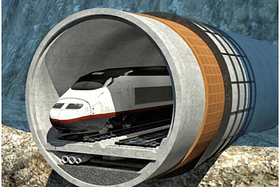Seventeen TBMs are being mobilised this year and three more will be deployed early next year.
Afcons Infrastructure has been recently awarded a contract by the National High Speed Rail Corporation Ltd (NHSRCL) to build India’s inaugural undersea rail tunnel for the Mumbai-Ahmedabad bullet train project.
Afcons Infrastructure Ltd, the engineering and construction division of the Shapoorji Pallonji Group, has announced plans to utilise approximately 20 tunnel boring machines (TBMs) during the current fiscal year, reports ET Infra.
This comes in as a number of cities in India embrace metro rail projects as an effective solution to address the issues of traffic congestion and enhance public transit systems.
“As many as 17 TBMs are being mobilised this year and three more will be deployed early next year,” said V Manivannan, Director, Construction Plant and Equipment (CPE) at Afcons Infrastructure.
“We own all these TBMs, and we are probably the only organisation in the country to own and deploy so many TBMs at a time,” he adds.
Afcons Infrastructure has been recently awarded a contract by the National High Speed Rail Corporation Ltd (NHSRCL) to build India’s inaugural undersea rail tunnel.
This tunnel is a component of the Mumbai-Ahmedabad bullet train project, spanning a total length of 21 km.
Situated at Thane creek, the undersea tunnel will extend for 7 km, positioned approximately 25 to 65 m beneath the surface.
The construction will involve the use of TBMs for 16 km of the tunnel, while the remaining 5 km will be constructed utilising the New Austrian Tunnelling Methodology (NAPM).
One of the largest TBMs will be deployed for the construction of the High-Speed Rail’s C2 package. “A slurry TBM will be deployed with a diameter of 13.1 m. It will be one of the largest in the country,” says Manivannan.
Afcons Infrastructure has previously successfully completed underwater tunneling projects and has established credentials in constructing India’s initial underwater metro tunnels beneath the river in Kolkata.
In this project, Afcons constructed three underground metro stations connected by two underground tunnels, each spanning 3.8 km in length.
Notably, a significant portion of these tunnels, approximately 520 m, is located beneath the river Hooghly.


